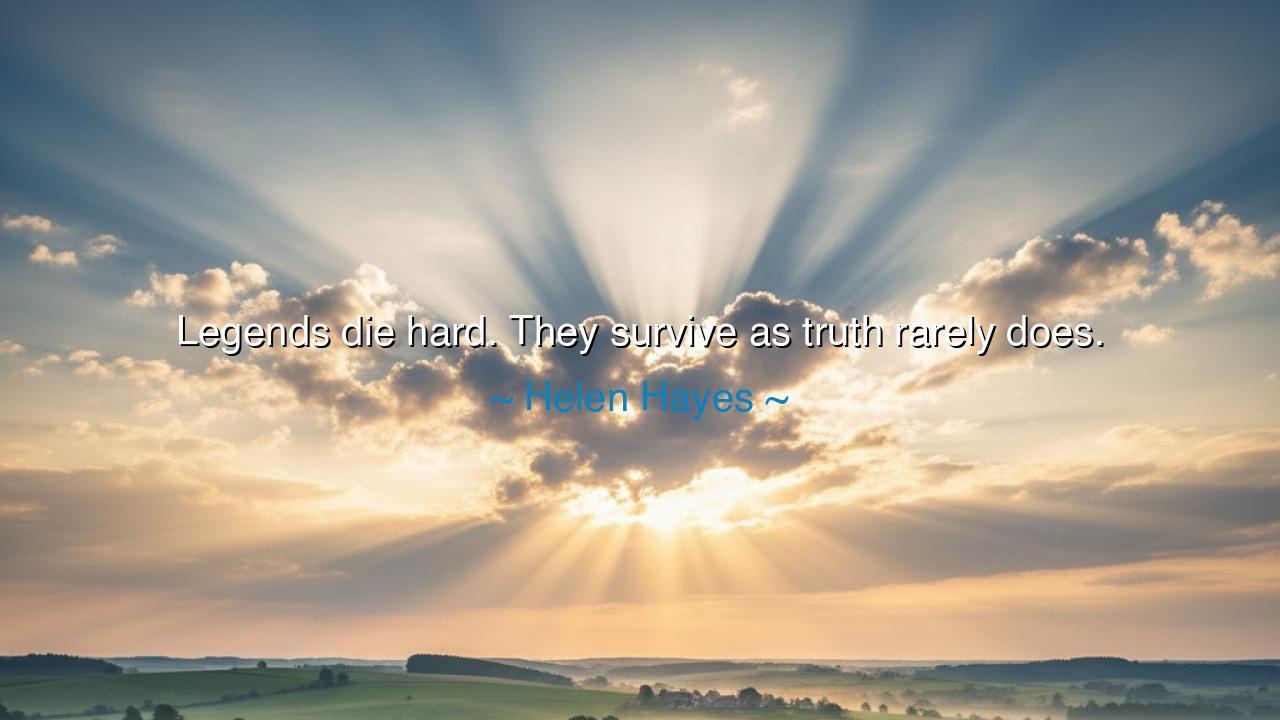
Legends die hard. They survive as truth rarely does.






Hear the reflective words of Helen Hayes, the “First Lady of American Theatre,” who declared: “Legends die hard. They survive as truth rarely does.” In this saying lies a lament and a revelation about the human heart. For men and women do not cling to truth with the same fervor as they cling to legends. Truth is demanding; it strips away illusions and asks us to live in its light. Legends, however, comfort us, inspire us, or flatter our desires, and so they endure long after truth has been buried.
The meaning of these words is that legends—stories shaped by imagination, longing, and myth—possess a strange immortality. They are passed from tongue to tongue, embroidered with glory, until they seem more real than the events that birthed them. Truth, by contrast, is fragile. It requires courage to accept and diligence to preserve. Truth often cuts against our hopes, while legends feed them. Thus, humanity often casts aside truth to embrace the story that feels sweeter, safer, or more heroic.
The ancients knew this well. Consider the tale of King Arthur. The truth of a warlord in the shifting chaos of early Britain is uncertain, scattered in fragments of history. Yet the legend of Arthur—the noble king, the shining knights of the Round Table, the quest for the Grail—lives on. The truth of the man has faded, but the legend endures, shaping nations, inspiring poets, stirring the dreams of countless generations. Hayes speaks to this reality: the human spirit more readily preserves legend than fact.
History too reveals darker examples. Consider the legend of the Lost Cause after the American Civil War. Defeated armies and broken cities gave rise not to acceptance of truth, but to a legend—that the war was noble, that slavery was not the root, that honor had been preserved. This legend endured for generations, shaping minds and poisoning history, while the harder truth—that the war was born of human bondage—was resisted, denied, and ignored. Legends die hard, but truth often dies easily.
Why is this so? Because truth is rarely flattering. It often tells us of our faults, our follies, our sins. Legends, on the other hand, present us as heroes, as victims, as noble dreamers. Men prefer to live in stories that glorify rather than facts that humble. And so legends cling to us like ivy upon old stone, while truth, unless guarded with fierce devotion, withers under neglect.
Yet we must not despair. For though legends may endure, truth is eternal, even when forgotten. It waits to be rediscovered, to be spoken again by those with courage. The task of the wise is not to destroy legends—for legends can inspire—but to distinguish them from truth, and to remind the world that truth, though fragile, is sacred. Legends may feed the imagination, but only truth can feed the soul.
Therefore, O seeker, learn from Hayes’ warning: do not mistake legend for truth. Revere the stories of old, but test them with discernment. Seek the truth even when it wounds, even when it fades against the brilliance of legend. For truth, though it may not always survive in the memory of men, survives in eternity. Hold fast to it in your own life, speak it even when it is unpopular, and live it even when the world prefers legends. For legends may endure in song, but truth, lived out, endures in eternity.






DNDat Nguyen
Hayes’ quote reflects the tension between truth and legend. It’s fascinating how something based on truth can evolve into something else entirely through myth and storytelling. But does this mean that truth is less important than the story we tell about it? Are we more inclined to embrace legends because they’re easier to understand and remember, even at the expense of losing the truth they’re based on?
GHLy Gia Huy
I find this quote to be a stark reminder of how truth can be easily lost in the face of compelling myths. Do you think legends persist because they offer a simpler version of events, one that’s easier to digest? How does this affect our understanding of history or reality? Is it possible for the truth to eventually overtake the legend, or is it always doomed to be overshadowed?
MPVo La Mai Phuong
Helen Hayes seems to be saying that truth is often fleeting and easily overshadowed by more enduring myths. It raises an interesting question: why do we often accept legends as truth, even when they’re proven false? Is it because they align more with our desires or perceptions? How do we reconcile our attraction to stories with the need for objective reality, especially when those stories feel more comforting?
PHPham Huyen
This quote really struck me because it speaks to the longevity of myths and the fragility of truth. Legends often outlast facts because they’re more compelling, more emotionally engaging. But do you think this is always a good thing? Are there cases where the survival of legends, rather than truth, actually harms society or impedes progress? How do we find a balance between the allure of legends and the necessity of truth?
GDGold D.dragon
Helen Hayes’ quote is fascinating because it touches on how stories and legends endure far beyond the truth they’re based on. It makes me wonder why society clings to legends or myths rather than accepting the more complicated or uncomfortable truth. Do you think legends are a form of comfort for people, offering simplicity and certainty where truth might seem more complex or unsettling?